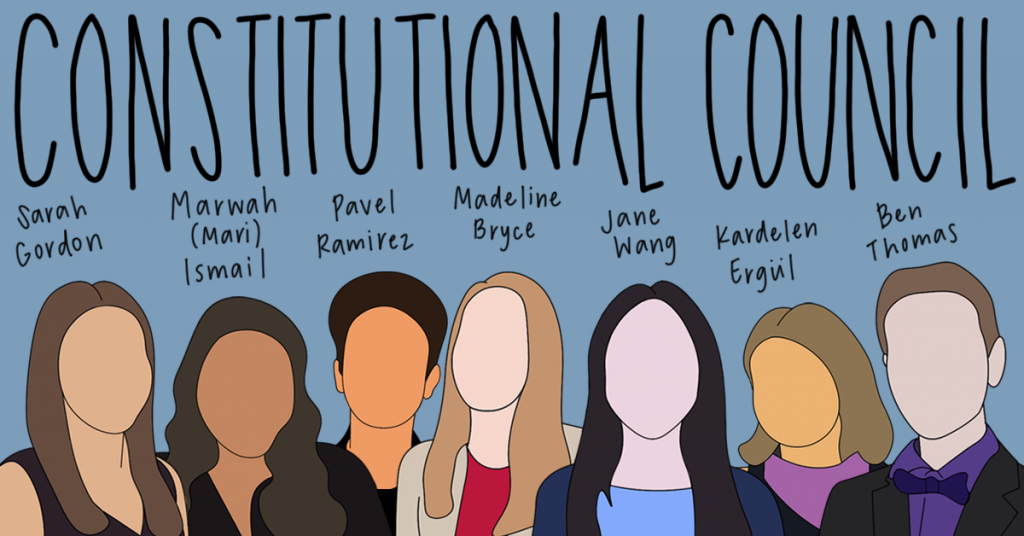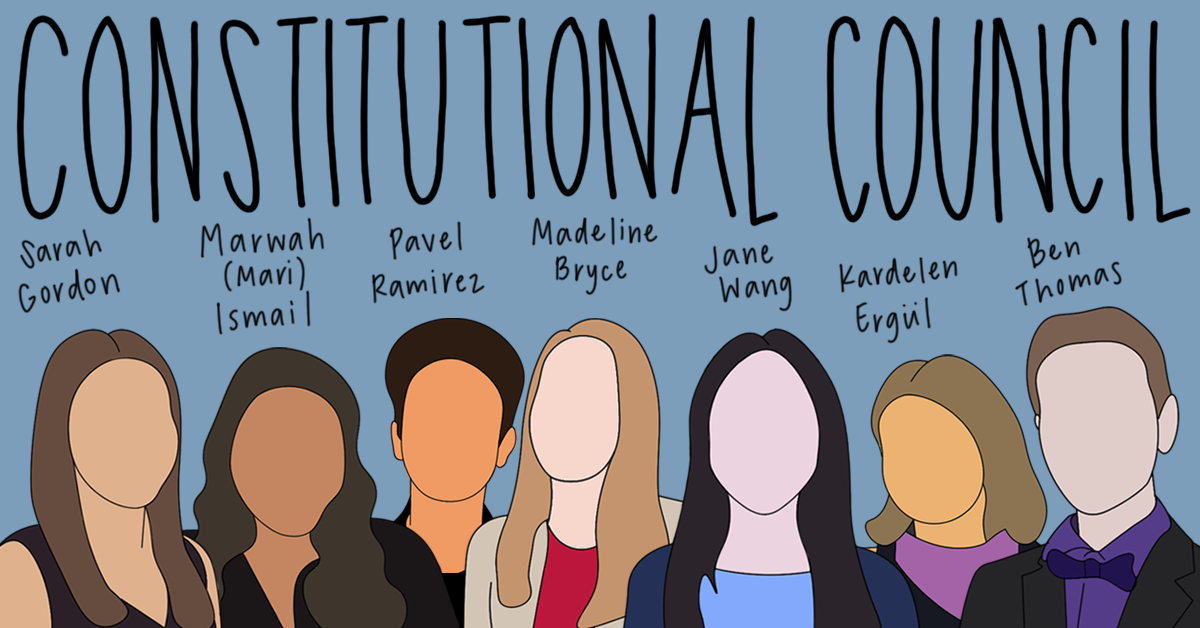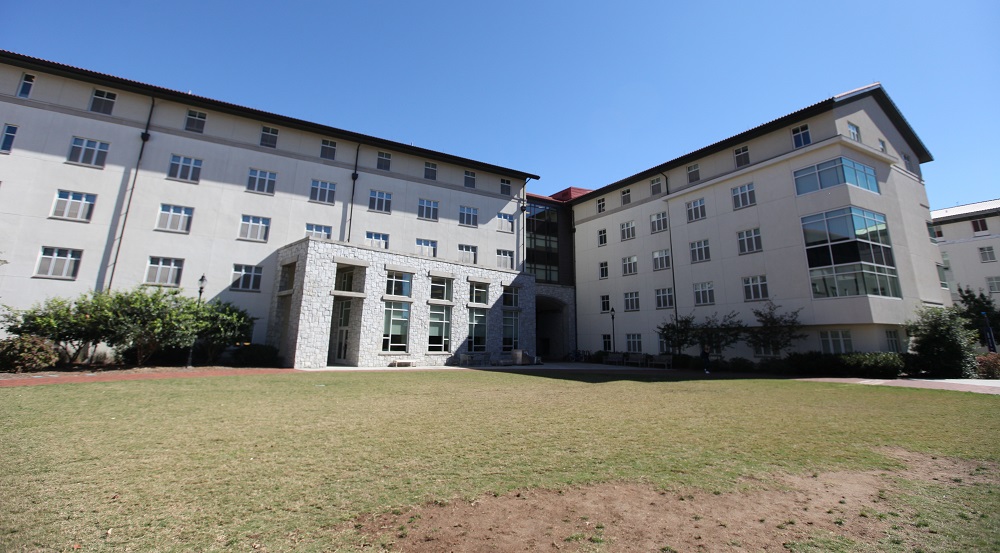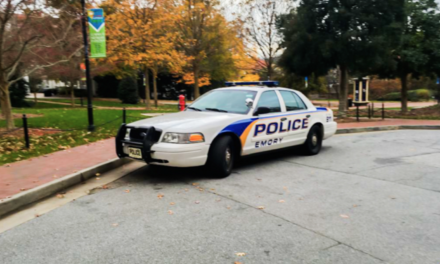
(Ally Hom/Photo Editor)
The Constitutional Council held a hearing for the case Friese v. SGA on April 11, following plaintiffs Emma Friese (24C) and Sruti Kumar’s (20Ox, 22C) challenge to the constitutionality of the March 29 run-off election for Student Government Association (SGA) president.
Friese and Kumar met while doing campaign work for former SGA presidential candidate Elisabet Ortiz (24C), who was disqualified from the election on March 16 due to her enrollment status as a gap-year student. Ortiz, who later dropped out of the race, urged students to vote “no confidence,” alleging that the Code of Elections only permitting full-time students to run is unfair to their disenfranchised peers.
The plaintiffs submitted the challenge to the Constitutional Council last week, alleging that SGA governing documents do not contain any “identifiable written procedure for how to fulfill the rules of a ‘no confidence’ win, resulting in a Constitutional Crisis.”
This alleged lack of procedure in the SGA governing documents was the main focus of the hearing.
Citing the “pervasiveness of these ambiguities [which] includes a lack of explicit written procedure for a no confidence victory,” Friese noted that “such lack of procedure forced the Board of Elections to misuse or interpret authority, both by making extreme interpretations not aligned with the direct nature with which the Board of Elections is supposed to abide by the code of elections, and by interpreting the SGA constitution, which they do not have the authority to do.”
Part III Article 2 Section I of the SGA code of elections states that “in the event that ‘no confidence’ wins, then the position shall be considered vacant, and rules governing vacancies in each governing body shall apply.” Although the SGA constitution does not make an explicit reference to a “no confidence” majority vote, the document outlines in Article V Section 2, the line of succession following the president as the executive vice president, then the speaker of the legislature, followed lastly by a ranking member of the legislature.
Friese noted that although the SGA documents outline how to fill vacancies in other positions, they do not explicitly do the same for the office of the president.
“It’s very jarring that it’s just absent how to fill a presidential vacancy,” Friese said. “That would be a fairly easy remedy and would honestly solve a lot of issues that were present in this case.”
The Board of Elections interpreted these documents when the general presidential election advanced to a run-off between Alyssa Stegall (21Ox, 23C) and “no confidence” on March 25, as well as when “no confidence” won the SGA presidential run-off election on March 29. SGA Attorney General Stewart Zelnick (20Ox, 22C), who represented SGA during the hearing, said the office of SGA president was considered vacant, so the Board deemed that vice-president elect Noah Marchuck (24C) would assume the position of SGA president and appoint a new vice president.
Zelnick explained that Marchuck will be sworn in as vice president first before succession protocols are carried out to make him SGA president.
Outgoing SGA President Rachel Ding (20Ox, 22B) noted that a similar situation arose during the spring 2021 election, when the Oxford SGA presidential seat was left vacant by a win of “no confidence.” In this instance, the vice president-elect, who was chosen in a run-off election, took over the position of president.
Friese and Kumar argued that without clear procedure, the Board did not have the authority to correctly interpret the documents.
When asked by Constitutional Council Justice Jane Wang (22C) if the plaintiffs are “saying the [presidential] position is supposed to remain vacant until the next election,” Friese responded that she does not know the best way to remedy the situation, as she is not a legislature on SGA.
Friese added that the Board’s decision was not “inherently wrong or illogical” given the stipulations available in the governing documents, but that the main issue was the lack of clear procedure.
Friese explained that she believes it is the responsibility of the Board to “thoroughly understand” the code of elections and address any ambiguities before the start of the election cycle, and that the Board “violate[d] its own rules” by instituting new elections regulations during the election cycle.
However, Ding said she was not aware of any ambiguities in the election code prior to the 2022 election, and that the Board has the power to make such interpretations.
“I don’t think that it’s reasonable to ask a student to predict all future vagueness or all future situations of the elections code, but I do think that it is the responsibility of students in the Elections Board to actually read the code of elections,” Ding said. “That is at a bare minimum.”

(Madi Olivier/News Editor)
Ding added that the code of elections is a “working document” and the entire SGA legislature and cabinet spent a minimum of a month during fall 2021 looking at code changes each week, ultimately passing three bills to “amend and improve the code.”
“These so-called ‘ambiguities’ regarding ‘no confidence’ in the code … were not realized in the fall of 2021 by anyone sitting on this hearing today,” Ding said.
Zelnick also refuted Friese’s claim, saying that while the Board is not against making necessary changes, they are granted the authority to make interpretations regarding election cycles. He cited Part II Article 1 Clause L, which states that the Board should “exercise all powers incident to and necessary for the execution of the above-listed responsibilities,” which includes overseeing the election race for SGA president.
“The Board’s interpretation regarding the ‘no confidence’ vote was necessary to uphold the value of student representation,” Zelnick said. “Elections for the office of SGA president are always decided by majority share of the vote to ensure that the elected president is in support of the majority of the participating student body voters.”
Elections Board Chair Mild Trakarnsakdikul (19Ox, 22B) agreed, saying the interpretations made by the Board were necessary during the election.
Friese also claimed that the Board “cannot be an unbiased source” when interpreting the SGA constitution, claiming that the SGA president serves as an advisor to the Board and is consulted to make interpretations.
However, Zelnick referred to this claim as “patently false” during his opening statement. He explained that all discussions he had with the Elections Board chair, SGA president and SGA advisor took place to “ensure that all relevant protocols were followed after the elections procedure” with full understanding of each government document.
Ding also refuted part of Friese’s claim, saying that during the election cycle, the role of the SGA president is to help aid the process through education.
“The SGA president does not sit on the board of elections, nor does the President [act as] a sitting advisor of the Board of Elections, but mainly is there to provide institutional knowledge, which is very critical to running SGA in general,” Ding said.
The first witness was Second Year Legislature Becky Schwartz (24C), who said she agreed that the current situation could be considered a “Constitutional Crisis.”
“It’s kind of a running joke in SGA that nobody likes the governing documents or just that they need a lot of revision,” Schwartz said.
Former Speaker of the Legislature Joseph Banko (23C) agreed with this statement, saying the idea that the governing documents should be revised is an “almost universally held opinion” within SGA. Banko, who said he has worked closely with the Governing Documents Committee during his time on SGA, said “this is a tremendous failure on the part of SGA.”
In response to a question from Zelnick, both Schwartz and Banko conceded that interpretations of SGA governing documents, including their own, boils down to a matter of opinion.
However, SGA Executive Secretary Grace Lee (21Ox, 24C), who is a member of the Governing Documents Committee, said that SGA consistently works to update SGA documents. Lee said that the committee made three changes to the elections code and two changes to the finance code this year.
“It’s kind of unfortunate that the Gov Docs Committee and that SGA is under these accusations despite all the work that they’ve continuously put forward,” Lee said.
Friese and Kumar thanked all parties for their “respectful and professional” participation in the trial in an April 12 email to the Wheel.
“We are very grateful for the participation of all parties in the hearing last night including the Defense, Constitutional Council and witnesses,” Friese wrote in an April 12 email to the Wheel on behalf of herself and Kumar. “We would like to thank all of the students who tuned in to watch and the friends who gave us so much personal support throughout this process.
“We are heartened by the respectful and professional way the Constitutional Council conducted the entire hearing and Challenge process, and we know the Council will carefully consider all facts of the case before making a good faith decision. No matter what, we are glad we brought this challenge as doing so has illuminated concerning ambiguities in our governing documents that might have otherwise gone unaddressed,” Friese added.
Zelnick wrapped up the hearing, reiterating that SGA is not opposed to editing the government documents and that “recommendations will be made to expedite these changes” in hopes of having them prepared for the 56th SGA’s administration next year.
“The 56th does at least face some degree of challenge, but I’m sure they’ll be able to overcome it and resolve the ambiguities that are present within this case,” Zelnick said.
Madi Olivier is from Highland Village, Texas, and is majoring in psychology and minoring in rhetoric, writing and information design. Outside of the Wheel, she is involved in psychology research and works for the Trevor Project. In her free time, you can find her trying not to fall while bouldering and watching Criminal Minds with her cat.







